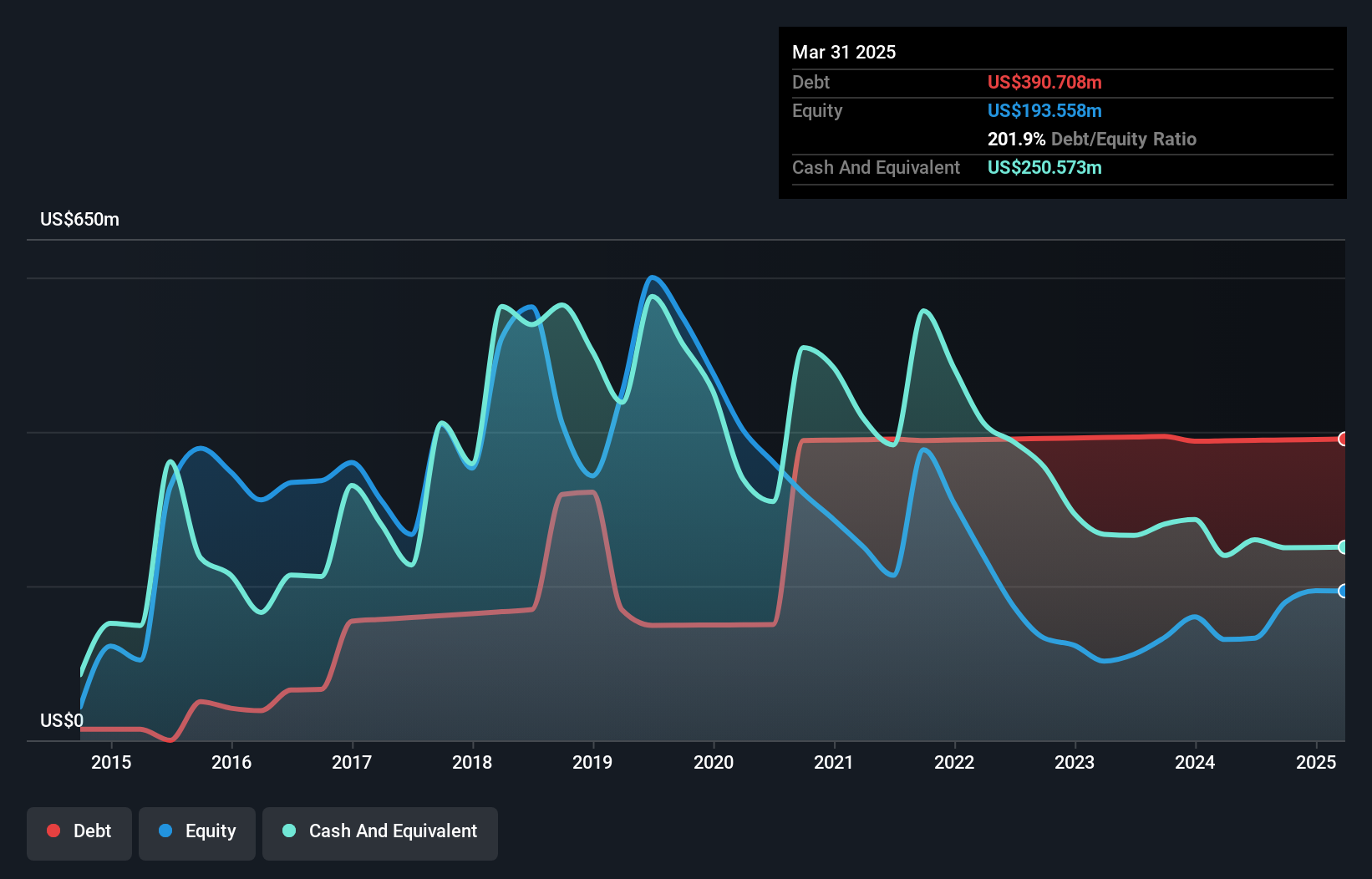Howard Marks put it nicely when he said that, rather than worrying about share price volatility, 'The possibility of permanent loss is the risk I worry about... and every practical investor I know worries about.' So it seems the smart money knows that debt - which is usually involved in bankruptcies - is a very important factor, when you assess how risky a company is. As with many other companies Amicus Therapeutics, Inc. (NASDAQ:FOLD) makes use of debt. But the real question is whether this debt is making the company risky.
When Is Debt A Problem?
Debt is a tool to help businesses grow, but if a business is incapable of paying off its lenders, then it exists at their mercy. Ultimately, if the company can't fulfill its legal obligations to repay debt, shareholders could walk away with nothing. However, a more usual (but still expensive) situation is where a company must dilute shareholders at a cheap share price simply to get debt under control. Of course, the upside of debt is that it often represents cheap capital, especially when it replaces dilution in a company with the ability to reinvest at high rates of return. When we examine debt levels, we first consider both cash and debt levels, together.
How Much Debt Does Amicus Therapeutics Carry?
The chart below, which you can click on for greater detail, shows that Amicus Therapeutics had US$390.7m in debt in March 2025; about the same as the year before. However, it does have US$250.6m in cash offsetting this, leading to net debt of about US$140.1m.

A Look At Amicus Therapeutics' Liabilities
We can see from the most recent balance sheet that Amicus Therapeutics had liabilities of US$152.9m falling due within a year, and liabilities of US$443.4m due beyond that. Offsetting these obligations, it had cash of US$250.6m as well as receivables valued at US$88.3m due within 12 months. So its liabilities total US$257.4m more than the combination of its cash and short-term receivables.
Of course, Amicus Therapeutics has a market capitalization of US$1.89b, so these liabilities are probably manageable. Having said that, it's clear that we should continue to monitor its balance sheet, lest it change for the worse.
Check out our latest analysis for Amicus Therapeutics
In order to size up a company's debt relative to its earnings, we calculate its net debt divided by its earnings before interest, tax, depreciation, and amortization (EBITDA) and its earnings before interest and tax (EBIT) divided by its interest expense (its interest cover). This way, we consider both the absolute quantum of the debt, as well as the interest rates paid on it.
While we wouldn't worry about Amicus Therapeutics's net debt to EBITDA ratio of 2.5, we think its super-low interest cover of 1.1 times is a sign of high leverage. So shareholders should probably be aware that interest expenses appear to have really impacted the business lately. One redeeming factor for Amicus Therapeutics is that it turned last year's EBIT loss into a gain of US$48m, over the last twelve months. When analysing debt levels, the balance sheet is the obvious place to start. But it is future earnings, more than anything, that will determine Amicus Therapeutics's ability to maintain a healthy balance sheet going forward. So if you want to see what the professionals think, you might find this free report on analyst profit forecasts to be interesting.
Finally, a company can only pay off debt with cold hard cash, not accounting profits. So it is important to check how much of its earnings before interest and tax (EBIT) converts to actual free cash flow. In the last year, Amicus Therapeutics created free cash flow amounting to 3.4% of its EBIT, an uninspiring performance. That limp level of cash conversion undermines its ability to manage and pay down debt.
Our View
Amicus Therapeutics's struggle to cover its interest expense with its EBIT had us second guessing its balance sheet strength, but the other data-points we considered were relatively redeeming. But on the bright side, its ability to to handle its total liabilities isn't too shabby at all. Taking the abovementioned factors together we do think Amicus Therapeutics's debt poses some risks to the business. So while that leverage does boost returns on equity, we wouldn't really want to see it increase from here. Even though Amicus Therapeutics lost money on the bottom line, its positive EBIT suggests the business itself has potential. So you might want to check out how earnings have been trending over the last few years.
If, after all that, you're more interested in a fast growing company with a rock-solid balance sheet, then check out our list of net cash growth stocks without delay.
New: Manage All Your Stock Portfolios in One Place
We've created the ultimate portfolio companion for stock investors, and it's free.
• Connect an unlimited number of Portfolios and see your total in one currency
• Be alerted to new Warning Signs or Risks via email or mobile
• Track the Fair Value of your stocks
Have feedback on this article? Concerned about the content? Get in touch with us directly. Alternatively, email editorial-team (at) simplywallst.com.
This article by Simply Wall St is general in nature. We provide commentary based on historical data and analyst forecasts only using an unbiased methodology and our articles are not intended to be financial advice. It does not constitute a recommendation to buy or sell any stock, and does not take account of your objectives, or your financial situation. We aim to bring you long-term focused analysis driven by fundamental data. Note that our analysis may not factor in the latest price-sensitive company announcements or qualitative material. Simply Wall St has no position in any stocks mentioned.
About NasdaqGM:FOLD
Amicus Therapeutics
A biotechnology company, focuses on discovering, developing, and delivering novel medicines for rare diseases in the United States and internationally.
Undervalued with reasonable growth potential.
Similar Companies
Market Insights
Community Narratives



